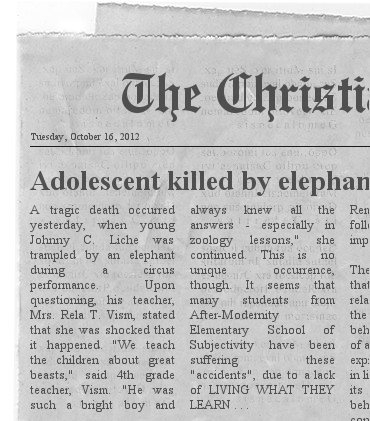Posts Tagged ‘Descartes’
“Adolescent killed by elephant in tragic misunderstanding”, claims newpaper, The Christian Appropriator
 The headline story of The Christian Appropriator began,
The headline story of The Christian Appropriator began,
A tragic death occurred yesterday, when young Johnny C. Liche was trampled by an elephant during a circus performance. Upon questioning, his teacher, Mrs. Rela T. Vism, stated that she was shocked that it happened. “We teach the children about great beasts,” said 4th grade teacher, Vism. “He was such a bright boy and always knew all the answers – especially in zoology lessons,” she continued. This is no unique occurrence, though. It seems that many students from After-Modernity Elementary School of Subjectivity have been suffering these “accidents”, due to a lack of LIVING WHAT THEY LEARN . . .
The article went on to explain that some methods of education lack the ability to appropriate what has been learned. Appropriation could be defined as,
from L. appropriationem (nom. appropriatio) “a making one’s own,”specifically regarding education – to take knowledge and apply it to actual living.
Some children know about fire, yet think they won’t get burned; know about ethics, but cheat without remorse; learn about the size and nature of elephants, yet stand below a bull during a dangerous performance – these are the results of taking things that are true and treating them as mere possibility. It is the motto of the After-Modernity Elementary School of Subjectivity, or (AMESS), to imbue such compartmentalization:
Learning that Truth is what You make it
The Christian Appropriator continues,
This is an issue on all fronts of life, Christianity not being immune. It is not uncommon for people to “know” something as true, yet not live it out. In fact, the knowledge, for some, proves to most often be empty at best and false at worst. The Fathers understood the difference between Knowledge, Understanding and Belief (latin, notitia, assensus, fidicia). It is only when one believes (fiducia) a something as True (a capital “T” being Objective Truth), will one apply it to their lives. Many would deny the existence of such objective truth, yet ironically “believe” that statement to be absolutely true. Everyone believes, it’s just some believe the elephant is a fact only in the story and others find the truth in the sound of his trumpet and the pound of his footstep. They need not be mutually exclusive, the information and the thing. It is just that the information must always point to the thing – AND THE THING IS THE POINT, NOT THE SOUNDS AND SYMBOLS ABOUT THE THING . . . NOT JUST THE LANGUAGE. This is where Anselm, Descartes and even Aquinas helped us a bit in their discussions of ontology – namely that something can be shown to exists because we can conceive of it in our minds. They apply this mainly to God and His existence. One might argue that could mean that because a little girl could draw a pink, panda with purple polka dots, dancing with monkey on a high-wire made of noodles, over a sea filled with mermaids that such things exist. This takes the argument further than it intends. It would merely prove that pandas, monkeys, colors, fishtails, women, oceans, dance positions and noodles exist. The unusual and unrealistic in the painting is just a combination of reality, otherwise the child could not conceive of them in their mind.
Truth is definitive, not relative. We are not to define it, rather discover it before “the shoe drops.”
By the way, the article above is not actual, but the point is. 😉